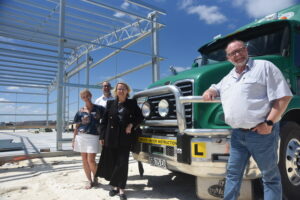
A coalition of 26 prominent industry groups in Australia has issued a warning regarding significant changes needed to the Labor government’s proposed overhaul of the country’s environmental laws. They argue that without these adjustments, the government risks establishing a slower and more complex approvals system, potentially hindering investment.
The alliance, which includes major organizations such as the Business Council of Australia, Group of Eight, Nationals Farmers’ Federation, Tech Council of Australia, CPA Australia, and the Insurance Council of Australia, has penned a joint letter to Environment Minister Murray Watt and opposition environment spokesperson Angie Bell. They urge these leaders to negotiate a balanced agreement that addresses their concerns.
In their correspondence, the groups have outlined seven critical amendments to the draft legislation. Among these demands is a request for clarification regarding the minister’s authority to preemptively reject proposals that may be perceived as having “unacceptable impacts.” Additionally, they seek the removal of the new environmental protection agency’s power to approve projects.
The letter emphasizes the need for collaborative dialogue: “The Alliance urges the government and opposition to work constructively on this legislation to unlock opportunities, support national prosperity, and streamline our approvals system.”
As negotiations advance, business leaders believe they are entering a pivotal phase. The Labor government aims to pass the new laws before the end of the current parliamentary session, which concludes in just four days. Despite a parliamentary committee’s report not being due until March 2024, Minister Watt has expressed a strong desire to finalize the legislation by Christmas.
Currently, Prime Minister Anthony Albanese and Minister Watt are in Western Australia for a cabinet meeting. During this meeting, Watt is expected to discuss the proposed changes with the state Labor government, which previously played a significant role in blocking an earlier iteration of the law. To secure passage, Labor will likely need to reach a consensus with either the Coalition or the Greens.
Watt has indicated a willingness to negotiate with whichever party can offer the most favorable terms based on the proposals already presented in Parliament. Business representatives are hopeful that the Coalition will adopt a reasonable stance that avoids forcing Labor into negotiations with the Greens. However, some within the government believe that a deal with the Greens may be the most feasible outcome, especially given the Coalition’s focus on settling an emissions reduction policy.
This scenario could significantly impact the Nationals, particularly as it pertains to demands for curtailing native forestry and agricultural land clearing—a key aspect of the Greens’ support conditions. There is notable resistance within the Nationals regarding the establishment of a national environmental protection agency (NEPA), which could become a contentious point in negotiations.
The proposed laws aim to expedite project approvals while empowering the new NEPA to prevent environmental destruction and impose substantial fines—up to $825 million or a percentage of revenue from any damage incurred.
Environmental groups and the Greens have voiced their concerns regarding the proposed legislation, citing inadequate climate considerations, insufficient protections for native forests, and broad ministerial powers that could be exercised when deemed to be “in the national interest.” Notably, former competition watchdog chief Graeme Samuel, who authored a foundational report in 2019 on the EPBC Act, has called for the removal of the “national interest” test, along with a loophole that currently exempts native forestry logging from the Act.
While the Business Council of Australia supports the passage of the legislation, they insist on specific amendments. Their recommendations include clearer guidelines on the minister’s authority to reject proposals before formal assessments, arguing that the existing threshold is too low and could jeopardize legitimate projects that might not be politically favorable.
Additionally, the business lobby advocates for a graduated enforcement scheme to mitigate penalties for technical or accidental breaches. Under their proposed model, the new NEPA would focus exclusively on compliance and enforcement, with project approvals remaining the responsibility of the environment department.
They also call for at least one state or territory to be accredited for approvals under the national framework once the reforms are implemented, thereby demonstrating that streamlined environmental regulation is attainable.
As discussions continue, the outcome of these negotiations will have significant implications for Australia’s environmental policy landscape and the broader business environment.







